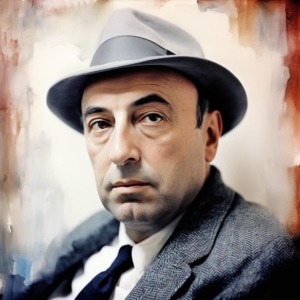By Norah Christianson
Ode to My Socks
By Pablo Neruda
Maru Mori brought me
a pair
of socks
which she knitted herself
with her sheepherder’s hands,
two socks as soft
as rabbits.
I slipped my feet
into them
as though into
two
cases
knitted
with threads of
twilight
and goatskin.
Violent socks,
my feet were
two fish made
of wool,
two long sharks
sea-blue, shot
through
by one golden thread,
two immense blackbirds,
two cannons:
my feet
were honored
in this way
by
these
heavenly
socks.
They were
so handsome
for the first time
my feet seemed to me
unacceptable
like two decrepit
firemen, firemen
unworthy
of that woven
fire,
of those glowing
socks.
Nevertheless
I resisted
the sharp temptation
to save them somewhere
as schoolboys
keep
fireflies,
as learned men
collect
sacred texts,
I resisted
the mad impulse
to put them
into a golden
cage
and each day give them
birdseed
and pieces of pink melon.
Like explorers
in the jungle who hand
over the very rare
green deer
to the spit
and eat it
with remorse,
I stretched out
my feet
and pulled on
the magnificent
socks
and then my shoes.
The moral
of my ode is this:
beauty is twice
beauty
and what is good is doubly
good
when it is a matter of two socks
made of wool
in winter.
Gifts. They can be wonderful. They can be strange, lovable, disappointing, hilarious, astonishing, insulting, heart-warming, feet-warming. For Christmas, some gifts I received were: a small iron bird (singing) perched on a block of teak, chocolates from Madagascar (astonishingly bitter, bitter!), a bracelet made of tiny silver frogs (possibly singing), a marvelous pepper jelly collection, a jar of wrinkle-correcting cream. The bird and the frogs are definitely me. It’s good that the fancy chocolates are bitter—I’ll eat them more slowly. That jar of wrinkle-correcting cream…I guess that’s a wake-up call.
So on to Neruda’s gifted socks. Pablo Neruda has written here an ode to his socks, a gift from Maru Mori, his friend’s wife. Colombian novelist Gabriel García Márquez has called Neruda “…the greatest poet of the 20th century in any language.” Neruda wrote in many styles; his poems were deep, full of gorgeous language, erotically charged, surreal, epical. Yet “Ode to My Socks” is one of my favorites. It’s simple, funny, endearing, zany, and full of marvelous metaphors—
my feet were
two fish made
of wool,
two long sharks
….
two immense blackbirds,
two cannons…
They are such handsome socks, they make his feet seem “unacceptable” to him. He has to resist the urge to save the socks, to put them in a golden cage and feed them birdseed and pink melon. But he puts on the “magnificent socks” and his goofy poem even has a “moral:” beauty and goodness is doubled where wool socks in winter are concerned.
If you received socks or a tie or wrinkle-correcting cream for Christmas, try writing an ode to them. It will make you feel better. And If you did not smile while reading Neruda’s poem, you had better pop an antidepressant.
I will not be attempting to tell you everything about Pablo Neruda’s extraordinary life. We tend to imagine poets to be quiet thinkers, introverts who protect their privacy, solitaries who write in the midnight hours with a candle and a bottle of vino at their side. Not so, Neruda. His political life alone was varied and very extensive. His love-life quite busy. I don’t know how he had energy or time to write.

Pablo Neruda was born Ricardo Eliécer Neftalí Reyes y Basoalto in Parral, Chile, in 1904. At ten, he was composing his first poems, and by his teens, he’d already published much poetry, prose and journalism. At this time, he took the pen name Pablo Neruda. Between 1927 and 1935, the Chilean government put him in charge of a number of honorary consulships, which took him to Burma, Ceylon, Java, Singapore, Buenos Aires, Barcelona, and Madrid. Neruda was serving as consul in Spain when he became a fervent Communist. This cost him his job when the Spanish Civil War broke out in 1935. But Neruda, strongly believing in Communisms’s ideological tenets—the pure form of Communism—continued his political activism—supporting the poor and the striking workers. He became known as “the people’s poet.” In 1971, the Communist party nominated him for president, but he declined, and campaigned for the also-leftist candidate, Salvador Allende.
I think of the aunt of someone I know. She’s happy, generous, effusive, helpful…but she is a racist. (She doesn’t read, so I won’t be exposed.) She is two people, and I have to work hard to look away from that dark side of her in order to appreciate the other. Likewise, some readers have found it difficult to disassociate Neruda’s poetry from his fervent commitment to communism. And very recently, feminists have “canceled” Neruda because they see him as a male chauvinist. I have often wondered if, in fact, it’s a good thing to learn much about the person behind the art. Sometimes, from what we learn, we decide we don’t like the artist. And sometimes, because of this, we determine to ignore his/her art. And that can be a great loss. Because what an artist does in his personal life does not devalue his art.
In 1971, Neruda was awarded the Nobel Prize for literature. After traveling to Stockholm to receive his prize, he returned to live in his beloved Chile. Neruda died in 1973, after Chile’s President Salvador Allende, the democratically elected socialist president and Neruda’s close friend, was ousted by a military coup led by Chilean General Augusto Pinochet. Recent 2023 toxicological investigations (reported by NPR, The Guardian, The Atlantic, USA Today and others) reveal that Neruda was poisoned. Feared by Pinochet, Neruda, the leftist politician and diplomat, is widely believed to have been poisoned by state agents just twelve days after dictator Pinochet’s coup.


Startling imagery, thank you.
Thank you for reading.
Thank you for this gift